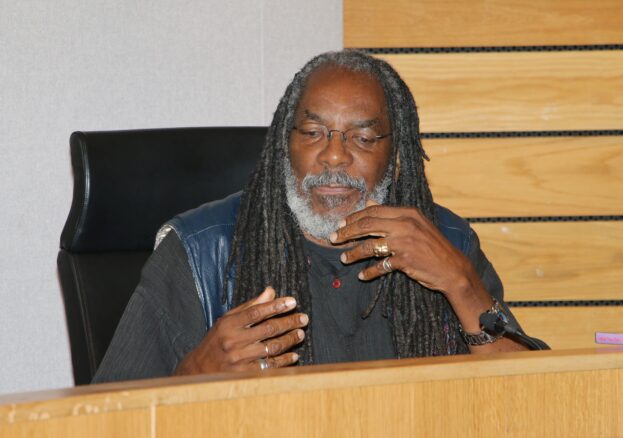
On Wednesday Oct. 27, community activist, historian and former university lecturer Bro Cecil Gutzmore will present Racism, Crime And Policing In The Johnson-(Cummings)-Sewell/Dick Moment!. He will provide a critical analysis, not only of the Sewell Commission report, but also the role of PM Boris Johnson, former PM aide Dominic Cummings and Metropolitan Police Commissioner Cressida Dick within Britain’s Crime & Policing narrative, and how that inter-plays within the British African communities.
The presentation will focus on the contrast and connection between the following:-
1. Claims/assertion by the Sewell Commission relating to Crime and Policing.
1.1. This chapter aims to demonstrate what drives these disparities, and propose ways of addressing them with a focus on 4 areas: (including) re-establishing mutual trust between communities and police service areas:
1.2. The data consistently highlights the over-representation of ethnic minority groups – both as perpetrators and victims – when it comes to hate crime, violent crime and drug-related offences. Police workforce diversity figures… remain low. Past injustices still loom large in perception of the police for some ethnic minority Britons, especially Black Caribbean people.
2. Now historical remarks from within the Afrikan-Caribbean Community relating to Crime and Policing.
2.1. “Stuart Hall reminded us that in the 1950s and ’60s the police were saying of the West Indian community that we were particularly law-abiding. As late as 1967 when I went to work in Lambeth, the Brixton police said that there were only two problems they had withWest Indians. First, the police wanted them to solve their domestic affairs, which as the police they could not do, and second black people had noisy parties at weekends! As far as crime was concerned the police reported no problem. I wonder if anybody would say such a thing about Brixton today. If that is so, it’s a powerful comment on what society has done to Black people between 1967 and 1986 (not to mention 2020/21), if we believe what we are told, we have changed from a law-abiding set of people into people who commit crimes and are bursting to riot.”*
This is the first BTWSC/African Histories Revisited (AHR) Open Voice Open Space presentation, which facilitates spaces for pundits and commentators to have their say via Zoom. For more details or to book, click here.
On Nov. 8, Bro Cecil will be a guest presenter on the Police And The Criminalising Of British African Youths By Numbers event. It kicks off with a video mash up presentation that highlights little-known and cause célèbre cases involving the police, the criminal justice system and groups of criminalised African youths, such as the Stockwell Six, Oval Four, Mangrove Nine, Waterloo Four, Thornton Heath 15 and Bonfire Night 12.
Bro Cecil, a former University of West Indies lecturer whose work within the British African community activism stretches back to the late 1960s, then gives his take on the cases, some of which he has a personal experience of.
This is a Monday Xtra History Sessions event, which takes place 6-9pm weekly via Zoom. The next event, Today Brixton Is Locked Off: The Day Black Lives Matter Shut Down Brixton. takes place Oct. 25. For details of the Sessions or to book, click here.
*By George Greaves in The Roots of Urban Unrest, J. Benton and J. Solomos, Editors, Pergamon Press, 1987, 99
